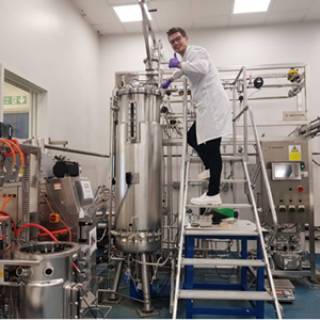What will a degree in biochemical engineering do for you? Find out about the career opportunities open to our graduates, from medicine to manufacturing new materials and consultancy.
What will a degree from UCL Biochemical Engineering give me?
Our teaching reflects current and future trends in the established pharmaceutical and biopharmaceutical industries. A degree from our department, therefore, provides a significant competitive advantage to our graduates and empowers them to take on exciting and challenging roles within the sector.
BEng and MEng graduates may be employed as engineers involved in the safe production of biomolecules, like antibodies, vaccines or viral vectors, or as researchers optimising biomolecules, processes and technologies. Graduates from our BSc programmes work at the interface between development and commercial production of novel therapeutics or at the intersection between production and marketing, having a comprehensive understanding of the full path of new medicines.
In addition to core science and engineering competency, you will acquire business and management acumen and a range of key transferable skills, such as communication and presentation skills, innovative thinking, team working and leadership skills. Portable skills that can be applied in a wide range of careers inside and outside the bioprocessing sector.
Typical roles our graduates move into include: Consultant Engineer, Business Analyst, Process Development Scientist or Process Engineer. Companies our graduates work for multinational pharmaceutical and biopharmaceutical companies such as GSK, Eli Lilly and Pfizer, small and medium enterprises such as Autolus, Orchard Therapeutics and Meira GTx, technology development companies such as Sartorius, Pall Life Science and Eppendorf, and government and public sector organisations such as the Cell and Gene Therapy Catapult, Centre for Process Innovation and the Office for Life Science.
Do you want to know more about how a degree from our department can set you up for an exciting and fulfilling career? Check out our alumni profiles:
UCL alumni and industrials partners are involved in our teaching activities giving first-hand insights into the industry. This provides students as well with excellent networking opportunities. In addition, we organise regular industry-led careers events. We also provide extensive support to our students in their job search by circulating opportunities within the bioprocessing industries.
Industrial placements
UCL alumni and industrials partners are involved in our teaching activities, giving first-hand insights into the industry. This provides students as well with excellent networking opportunities. In addition, we organise regular industry-led careers events and provide extensive support to our students in their job search by holding CV workshops, careers clinics and one-to-one sessions with personal tutors. The department has an excellent track record of engaging closely with industry which puts UCL Biochemical Engineering graduates at a significant competitive advantage in their job hunt as the department can circulate opportunities and collaborator companies and within the bioprocessing industries.
Amandeep, Hamza and Sam have shared their experiences of spending time working for companies as part of their degrees:
- Amandeep Varia, Eli Lilly
- I’m Amandeep and I’ve just completed a placement that formed part of the 4th year of my MEng degree.

I did my placement in Eli Lilly at Kinsale in The Republic of Ireland working on medicine manufacturing processes. My project focused on designing a new piece of equipment that would standardise operations resulting in cutting costs and time, then testing its effects and how much of an improvement it made.I have had a great all-rounded experience! Having to live in another country for over a year has been amazing, alongside working in a pharmaceutical company for the first time. I have had the opportunity to gain a lot of responsibility within the company with my projects and work with a wide variety of people (automation, cleaning and project engineers etc.). I have gained the ability to get a rounded view of the life of an engineer and the daily tasks and important responsibilities that an engineer holds. Not only have I learnt a lot during my placement, but the MBI courses at UCL have also allowed me to further broaden my knowledge on the new concepts and ideas related to my career as an engineer.
Year in Industry has helped me to better understand how the knowledge I gained from my degree is applied to help make the medicines we all rely on. I understand the wider impact that I can have as an engineer and my vital role within this context. As a result, I am now certain that I would like to continue to work within the pharmaceutical industry as an engineer.
- Hamza Patel, GSK
- My name is Hamza Patel and I did my Year In Industry placement with Glaxo SmithKlein (GSK) working within their cell and gene therapy group. I worked on a project to develop a cost-effective manufacturing process to produce engineered T-cells used to treat several types of cancers.

The environment and culture at GSK is dynamic and engaging making it a great workplace. I was given plenty of freedom to design my own experiments and take charge of my own work. The placement has been thoroughly enjoyable and has provided a great platform for my personal and professional development. Above all, the placement has allowed me to practically apply theoretical concepts learnt throughout my degree to develop medicines that have the potential to save millions of lives. My experiences at GSK have motivated me to do a PhD in this field and ultimately pursue a career in research. - Sam Hemphil, UCB
- I’m Sam Hemphil and I’m just completing my 4th year MEng Engineering (Biochemical) programme at UCL, this is me working at upstream processing at UCB.

I have been working with UCBs fermentation process development team on a number of projects at different stages of the drug development cycle. During my time I have had the chance to work with fermentations from the small scale (250ml) to large pilot plant scale (200L). I have also gained lots of experience on the analytical side of things and been able to use a wide range of industrially-relevant techniques to assess the material we are producing to ensure that it will be safe for the patient!During my year I have learned a lot of technical skills but also developed my team working, communication and leadership skills. The work is team-oriented and everyone’s experiments contribute to the success of the project. I also had the opportunity to lead group experiments and coordinate team activities.
The year in industry has given me a great insight into what working in the biopharm industry is like. I am hoping to use the skills and experience I have learnt this year to find a job within the industry.
 Close
Close

